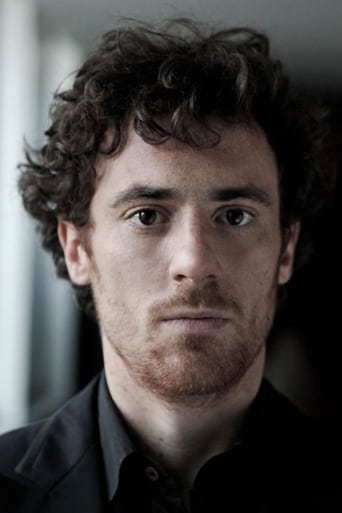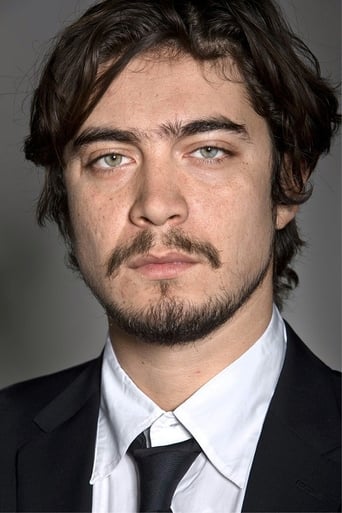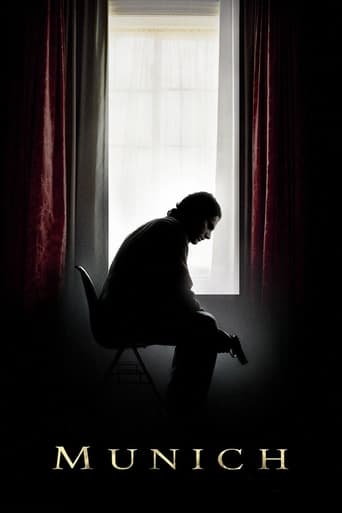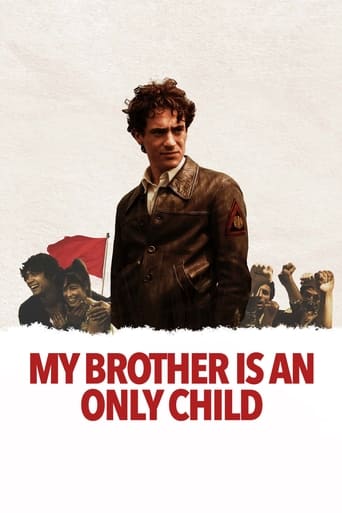
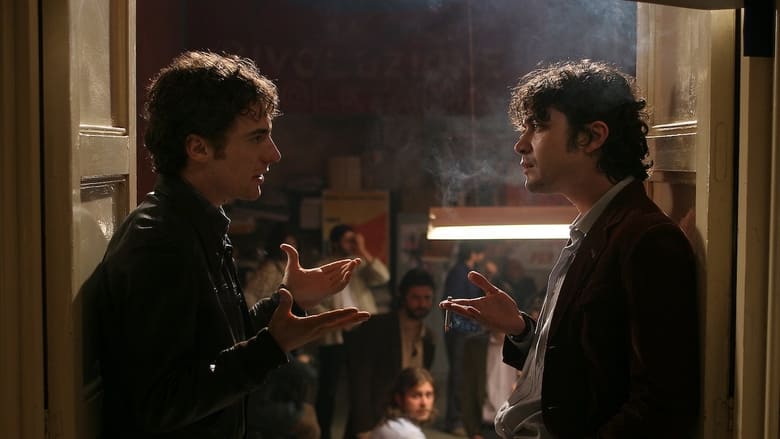
My Brother Is an Only Child (2007)
Accio and Manrico are siblings from a working-class family in 1960s Italy: older Manrico is handsome, charismatic, and loved by all, while younger Accio is sulky, hot-headed, and treats life as a battleground — much to his parents' chagrin. After the former is drawn into left-wing politics, Accio joins the fascists out of spite, but his flimsy beliefs are put to test when he falls for Manrico's like-minded girlfriend.
Watch Trailer
Cast
Similar titles

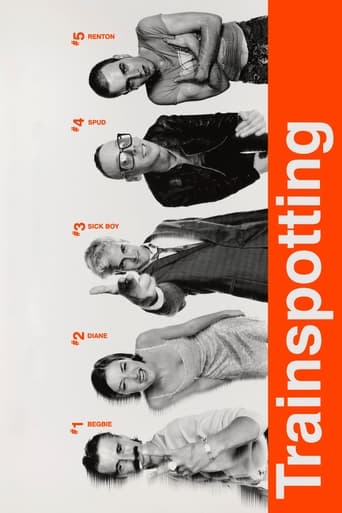
Reviews
Good films always raise compelling questions, whether the format is fiction or documentary fact.
The film never slows down or bores, plunging from one harrowing sequence to the next.
Although I seem to have had higher expectations than I thought, the movie is super entertaining.
By the time the dramatic fireworks start popping off, each one feels earned.
There's this much to be said for this movie from the ranks of Italy's new young directors and actors: The quality of the acting was at least one notch above the usual fare, which almost never transcends the clichéd facial expressions and intonations we expect to find in TV dramas and sit-coms. This new generation of actors and directors was raised on US television imports ("telefilms") and Latin-American soaps, and it definitely shows in the uninspired and uninspiring quality of their work. And one gets the impression that 90% of them come from Parioli, a very well-to-do neighborhood of Rome, that would be the rough equivalent of coming from Santa Monica, Lake Forest IL, or Westport Conn—all those perfectly groomed faces coming from families of the Italian haute bourgeoisie with unlimited funds to advance their children's "acting career." If it weren't for Elio Germano as Accio (as well as Luca Zingaretti as Accio's fascist mentor and Anna Bonaiuto as his wife), this movie would probably fall into the same category of banalized film-making with all the rest. But Germano's performance is not enough to salvage a film that fails to rise above a rating of "mediocrity +". Certainly it was an interesting idea to situate the action in Latina, a city built from scratch by Mussolini's fascist regime after it had drained the surrounding swamp land (the "bonifica" that was one of Fascism's highly touted achievements). All of the city's architecture was inspired by fascist "monumental" design.Regrettably, Luchetti has done little of interest to exploit this setting for his family drama other than to bring up the same old cliché of opposing extremisms (the thuggery of the neo-fascist right vs. the banditry and targeted terrorism of the extra-parliamentary left). And the drama of the conflict between these two extremisms is used altogether too much to drive the plot forward. Some Italian commentators disliked this film because it seemed to go over the same old ground in the same old way—when it was time, presumably, to move on to new subjects. But the problem was not that it rehashed Italian history—the problem was the "hash." Bellocchio, after all, did a wonderful job of re-interpreting to Italians the experience of the Red Brigades in his "Buongiorno,Notte". But here the audience is simply given a choice between fascist hooliganism and a lunatic left, when actually the situation in Italy in the 60s and 70s was much more complicated and nuanced. Millions of Italians belonged to parties and movements that were seriously committed to a progressive transformation of Italy that did not involve knee-cappings and assassinations. And so Luchetti ends up confirming (perhaps despite himself) the American/Berlusconiano vision of the world: "Forget about ideology—it's all about individual freedom and authenticity in your personal relationships." And finally we can see the effects of Berlusconi's TV stations and their ilk also in the movie's script. After 20, I stopped counting how many times the characters said, "Ma Che Cazzo Dici?"("What the f#%k are you saying?"). It is a measure of the moronization of the Italian public under the sway of Berlusconi and Berlusconian media that the scriptwriters think that they can get a laugh out of an Italian audience with this phrase each and every time it is said—and sadly they're probably right.
MY BROTHER IS AN ONLY CHILD ('Mio fratello è figlio unico') is a title that may confuse the casual movie viewer, but it is an apt summation of the rigorous story that this excellent Italian film by Danielle Luchetti (adapted from a novel by Antonio Pennacchi) represents - the coming of age of two brothers in the confusing and turbulent 1960's and 1970's in Italy. While the film deals with the myriad political factions that disrupted life especially among the students of that era, the main focus of the story is the indomitable brotherly love that bonds the two main characters. Accio Benano (Vittorrio Emanuele Popizo) as a child is a mischief maker who has entered seminary to become a priest, but his innate search for truth and meaning soon finds him returning home to his little family in a Mussolini-fabricated town called Latina, a village built on promises of communal well-being (a housing project was built but the poor villagers are refused access to it), but languishes in the poverty of lost hopes and deflated spirits. Accio's father, mother, younger sister and older brother Manrico (Riccardo Scamarcio) are making ends meet, but are frustrated with the political oppression of the working class. Time passes and the older Accio (Elio Germano) comes under the influence of Mussolini's 'idealism' with the tutelage of his older friend Mario (Luca Zingaretti) and embraces Fascism while Manrico has aligned with the communists, and it is this dichotomy of belief that sets Accio apart from his brother as well as his family who are communist sympathizers. Accio's personality places him in harms way with the law, with women (he has longings for the women in both Mario's and Manrico's lives), and ultimately with turns of events that threaten to pit brother against brother. The resolution of these conflicts makes for a fascinating study of familial ties, brotherly love, and a keenly observed sociopolitical history of Italy that is as enlightening as it is entertaining. While Germano and Scamarcio are the obvious stars of this well acted film, the supporting cast (including such fine actors as Angela Finocchiaro, Massimo Popolizio, Alba Rohrwacher, Anna Bonaiuto, and Diane Fleri) is uniformly strong. This epic film demands full attention to the script (Italian with English subtitles) to follow the various political differences, but the tenor of the film is one of the excitement and concomitant love of two brothers coming of age in the best Italian style! It is a joy to watch and a lesson in history about which we should all be aware. Grady Harp
Saw this as part of the London Film Festival, and was expecting a belter. And how disappointed was I? VERY.What could have been a very interesting look at how different political views can co-exist within the family instead descends into a series of disjointed rubbish with no real purpose and no explanation.The central characters were introduced, but without much substance, and there were holes in the plot that you could have driven a double decker bus through. About 20 minutes too long, it actually had my husband snoring after an hour, that can't be good in the entertainment stakes, can it? With a denouement that comes out of nowhere, this left me feeling very disappointed and unsatisfied. All in all, a good idea, totally wasted.
Simply put, a very good movie. As somebody who lived through part of those years, I really appreciated the way it managed to recreate their social and political 'atmosphere'. Yes, it is not the first flick to deal with those topics, but hey, how many movies about WW2 have we seen so far? Was Flags of our Fathers less good for this reason? I particularly liked Accio's description of personal relationships between the brothers, as well as the intriguing political evolution. I thinks that Scamarcio's presence could also take a younger audience to this movie, something which would be very good as some stories are just worth remembering (I can't stand the "let's forget about it and move on towards modernity" approach; awfully dangerous for a civilized society). Back to the cinema factor, all actors fit well in their roles, although the Accio's sister was kind of lame at times. Zingaretti's performance as a hardcore fascist, on the other hand, was made even more intriguing by his close association with the ever-different character of Commissario Montalbano in the popular TV transpositions of Camilleri's novels (which by the way I strongly recommend to anyone interested in Italian written fiction).
